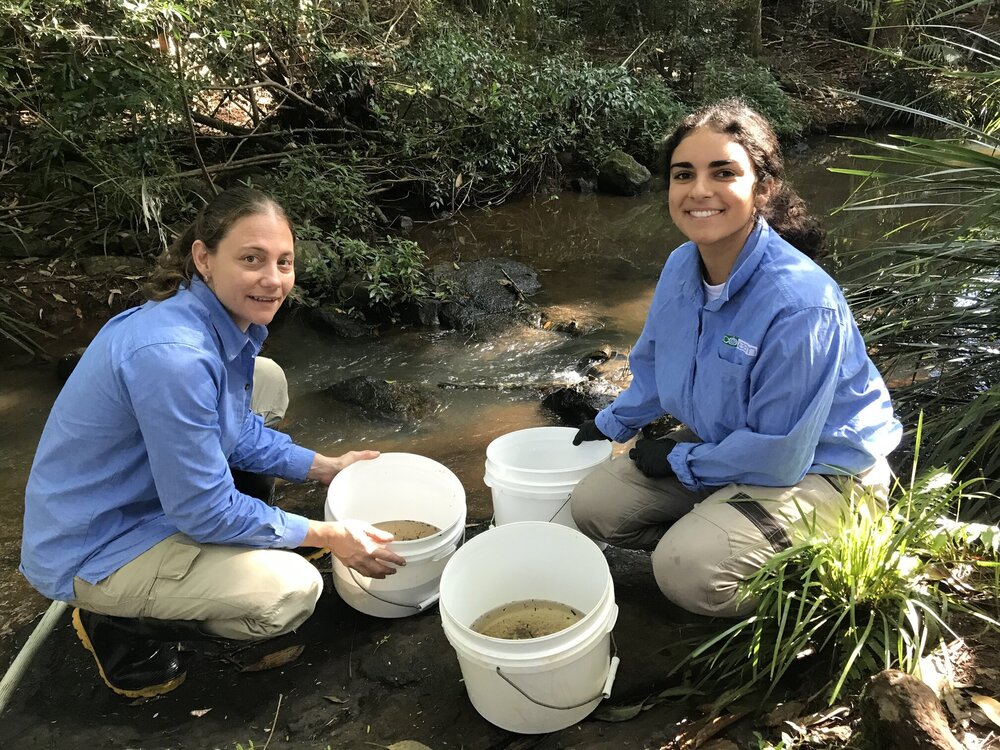Testing the health of Tucki Tucki Creek in Goonellabah
Simon Mumford
29 June 2024, 8:00 PM
 Ecoteam staff recording the range of macroinvertebrates in Tucki Tucki Creek Goonellabah. Photo: supplied
Ecoteam staff recording the range of macroinvertebrates in Tucki Tucki Creek Goonellabah. Photo: suppliedThe work of local Landcare Groups is invaluable to the community. The 2km Tucki Tucki Creek regenerative site along the Birdwing Butterfly Walk in Goonellabah is a wonderful example of their work.
Goonellabah Tucki Landcare secretary Shaen Springall has been working with other volunteers on this site for over four years. They have planted native rainforest seedlings, poison noxious camphor laurel trees, and then weed the area by hand until the seedlings are large enough to form a canopy.
A regenerative program has also started along the new development on Just Street in Goonellabah where the Tucki Tucki Creek flows. That is managed by Just Street Landcare coordinator Stephen Nelson.
The Lismore App ran a story on April 9 this year about council destroying two years of hard work by felling camphor laurel trees that crushed the native seedlings (read here). At that time, Shaen Springall mentioned the group wanted to test the water quality of Tucki Tucki Creek so they could measure and monitor the health of the waterway over a period of time.
Both Shaen and Stephen were keen to have their large-scale riparian rehabilitation efforts aimed at improving the ecosystem health of the Tucki Tucki Creek evaluated on a scientific basis. This will enable the Landcare groups to inform Council, funding agencies, sponsors and the wider community how the creek and stream bank environments are faring. The team first approached Lismore-based environmental consultancy Ecoteam in mid-2023.
Ecoteam very generously agreed to monitor the health of the Tucki Tucki Creek bi-annually over a period of three years, on a pro bono basis. The major cost incurred by the company beyond staff time is sending test results away for laboratory analysis, at SCU’s Environmental Analysis Laboratory (EAL) and further afield.
Lise Bolton is the company’s Managing Director and a Chartered Environmental Engineer who specialises in soil and water management and treatment and is coordinating the bi-annual tests. Discharge from stormwater outfalls along the 3-kilometre length of the Tucki Tucki Creek, which is looked after by both Landcare groups, is just one factor contributing to stresses on the freshwater creek. The pace of housing developments nearby, farm stock further upstream, and the impact of flooding are others.
The first suite of tests was carried out in early December 2023, and the second last Friday (28 June).

(Lise and Ana evaluating aquatic life on the Tucki Tucki Creek. Photo: supplied)
One of the testing sites was downstream from the stormwater outfall, which was extensively planted out in Stage 1 of the Just Street Landcare project. The second site was at Birdwing Butterfly Gully. Elements in the testing process include in-situ and laboratory water quality monitoring and a stream health, fish and macroinvertebrate assessment.
Lise reported that the results from the first water quality testing showed no major contaminants, including hydrocarbons, pesticides, or PFAS, were present, and metals were within guidelines limits. Some nutrients were elevated slightly above the Australian and New Zealand guidelines (ANZECC) for fresh and marine water quality, but overall, the water quality was fair at the time of sampling. Macroinvertebrates (aquatic creatures including insects, worms and crayfish), fish species and overall creek health were also assessed at the two sites.
However, the assessments found overall species abundance (fish and macroinvertebrates) were very low, indicating urban pressures have impacted the types of fish species present. Lise explained that a Stream Invertebrate Grade Number Average Level Score or ‘SIGNAL’ Score provides information on the health of a waterway by assessing the abundance and types of macroinvertebrates present. A SIGNAL Score of 3.3 was calculated for both sites. SIGNAL Scores of less than 5 indicate pressures from the urban catchment, which result in poor water quality and pressures on aquatic species.
‘Ongoing monitoring and assessment of biological, physical and chemical indicators will provide important information for the ongoing improvement of Tucki Tucki Creek and could act as a precedent for urban rivers and catchments in the Lismore LGA,’ Lise concluded.
Shaen and Justin are confident that future Signal Scores will reach a 5 and above as their regenerative work continues and the natural growth matures.
About Eco Team
Ecoteam – a division of parent company Ecotechnology Australia Pty Ltd - has been in existence since 2003 when founder Dr Keith Bolton identified the critical need for ‘natural solutions for environmental challenges’. A former post-doctorate fellow at Southern Cross University, Keith has guided the company’s expansion to its current position. Ecoteam environmental consultants design, operate and manage water, wastewater and stormwater systems, as well as providing soil, water, mould and asbestos contamination testing and remediation. The company is a local success story.
Ecoteam has a staff of 20, including environmental scientists and engineers, an administration team and a water treatment services operations team including aboriginal employees who work in the communities where they live. Ecoteam provide a wide range of services for public and private sector clients – often at massive scale. These clients include Lismore City Council, Logan Shire Council in Queensland, and a number of other local councils and state government departments.

